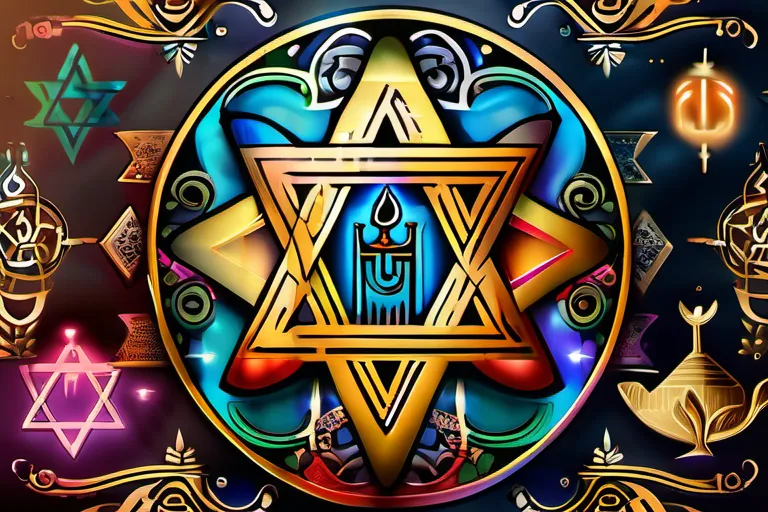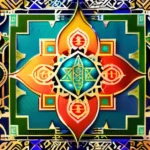Explore the key divisions within Judaism, their beliefs, practices, and unique characteristics.
Judaism is one of the oldest monotheistic religions in the world, with a rich history and diverse traditions. In this article, we will delve into the major sects of Judaism, providing an in-depth look at their beliefs, practices, and unique characteristics.
Orthodox Judaism: Tradition and Faith
Orthodox Judaism stands as a pillar within the diverse landscape of Jewish religious practices, emphasizing unwavering adherence to traditional Jewish law and customs. But why does Orthodoxy hold such a significant place? Is it merely a historical remnant or is there something deeply compelling about its strict observance?
Imagine a river that has flowed through centuries, carrying with it the teachings of the Torah, every drop representing a commandment or tradition. For those who follow Orthodox Judaism, they believe this river should be crossed precisely as it was thousands of years ago, without deviation. They see themselves as guardians of an ancient heritage that must be preserved in its entirety.
The practices and beliefs of Orthodox Jews are intertwined with every aspect of life, from dietary laws to daily prayers. For them, Jewish law (Halacha) is not just a set of guidelines but a living system that dictates how they should live their lives. They believe in the literal interpretation of religious texts, making their faith deeply rooted and unchanging.
One might wonder, why would anyone choose to adhere strictly to such rules? Perhaps it’s about finding stability in an ever-changing world or ensuring a connection to a time when traditions were less diluted by modernity. The Orthodox Jew finds their identity not just as part of a community but as participants in a grand, ongoing narrative that stretches back millennia.
Their unique characteristics are also evident in the roles they play within society. Many Orthodox Jews choose to live communally or join enclaves where traditions can be upheld more easily. Their schools and places of worship, like synagogues, reflect this dedication to a lifestyle that integrates religious practice seamlessly into daily routines.
So, as we explore Orthodox Judaism further, one might ask: in an era of rapid change, is the commitment to tradition a necessary anchor or a barrier to progress? The answer lies within the hearts and minds of those who embrace this path, for them, it’s not just about following rules but living a life imbued with profound meaning and purpose.
Conservative Judaism: Balancing Tradition and Modernity
Conservative Judaism, often seen as the middle ground between Orthodox and Reform Judaism, offers a unique blend of tradition and modernity. Have you ever wondered how this sect manages to maintain its roots while still embracing change? Let’s dive into the history, beliefs, and practices that make Conservative Judaism such an interesting and dynamic segment within the Jewish community.
In essence, Conservative Judaism seeks a balance between tradition and modernity. Imagine walking on a tightrope—on one side is Orthodoxy with its strict adherence to ancient laws, and on the other is Reform Judaism’s more flexible approach. Conservative Judaism is like a skilled acrobat, finding just the right spot that allows for growth while preserving the core values of Jewish tradition.
The origins of Conservative Judaism can be traced back to the late 19th century in Germany and the United States. Early proponents sought to modernize certain practices without completely abandoning them. They believed in the importance of adapting religious rituals to fit contemporary life, but only after careful consideration. For example, Conservative Jews might celebrate Synagogue services with some traditional music and prayers, while allowing women to participate more fully than in Orthodox settings.
In terms of beliefs, Conservative Judaism upholds the Torah as a central text but interprets its commandments in light of modern ethical standards. This approach challenges us to ask: How do ancient texts relate to our lives today? For instance, while Conservative Jews might keep kosher dietary laws, they may also consider animal welfare and environmental concerns when making food choices.
When it comes to Bar Mitzvahs or weddings, Conservative Judaism offers a range of options. Families can choose between more traditional ceremonies that adhere closely to ancient customs or those that are tailored to reflect personal values and contemporary sensibilities. This flexibility allows individuals to honor their heritage while still feeling connected to modern Jewish life.
In conclusion, Conservative Judaism stands as a testament to the resilience of tradition in the face of change. It invites us to explore how ancient texts can speak to our current world, providing both comfort and challenges for those seeking a meaningful path within the Jewish faith.
Reform Judaism: Embracing Change and Inclusion
Imagine Judaism as a vast, ever-evolving ocean where different streams of thought and practice flow side by side. One such stream is Reform Judaism, which has carved out its unique path by embracing change and inclusivity.
Reform Judaism was born in the 19th century as a response to the challenges posed by modernity. It asks us to ponder: Can tradition adapt to new realities? The answer, for Reform Jews, is an emphatic yes. This sect redefines religious rituals and beliefs to fit into the contemporary world while maintaining its core values.
One of the hallmarks of Reform Judaism is its emphasis on social justice. It’s not just about following commandments; it’s about making a positive impact in society. This approach makes us wonder: Is religion merely a set of rules, or does it guide us to do good? For Reform Jews, faith is an active force for change, from advocating for civil rights and environmental protection to promoting equality and human dignity.
The inclusive nature of Reform Judaism also challenges traditional boundaries. It opens its doors to people of all genders, sexual orientations, and backgrounds, questioning: Is true community possible only among those who share the same identity? By welcoming converts and fostering interfaith dialogue, Reform Judaism seeks a more diverse and united Jewish community.
The liturgy in Reform Judaism is another area where it stands out. Services are often modified to be more accessible and meaningful. This approach leads us to ask: How can religious practices become more relevant and engaging for modern Jews? By incorporating contemporary music, personal reflections, and a dynamic leadership style, Reform synagogues create an inclusive space that resonates with many.
In essence, Reform Judaism is about finding a balance between tradition and progress. It invites us to reflect on our own beliefs and practices, challenging us to ask difficult questions and seek meaningful answers in the context of our time. As we navigate this journey, one thing becomes clear: Change can be both necessary and transformative.
By embracing Reform Judaism’s progressive outlook, Jews are invited to participate actively in shaping their faith and making a difference in the world. This sect offers not just a way of life but a dynamic, evolving path that continually seeks to uplift all individuals within its community.
Reconstructionist Judaism: Rediscovering Jewish Identity
How can Judaism, a religion with deep roots and traditions spanning millennia, continue to evolve and stay relevant in today’s rapidly changing world? Enter Reconstructionist Judaism, a unique sect that seeks to redefine its practices and beliefs within contemporary contexts.
Reconstructionism is like a garden where the old vines of tradition intertwine with modern saplings. It was founded by Rabbi Mordecai Kaplan in 1937, who believed that Judaism should be understood as a culture rather than just a religion. This perspective challenges us to think about what it means to practice Judaism today.
But why would anyone want to change something so ancient and profound? The answer lies in the very nature of human life. Just like a river changes course with time, so too must our religious practices adapt to reflect who we are as individuals and as a community. Why stick to old ways when new insights can bring us closer to God?
In practice, Reconstructionist Judaism emphasizes the importance of community participation and personal choice in defining one’s Jewish identity. Rituals and traditions are seen not as immutable laws but as tools for creating meaningful experiences that resonate with contemporary values.
One key aspect is its approach to intermarriage. Unlike more traditional forms of Judaism, which often discourage or outright prohibit it, Reconstructionist Judaism sees interfaith relationships as opportunities to deepen spiritual bonds and enhance community connections. This perspective challenges us to rethink what it means to be part of a religious group.
Another distinguishing feature is its attitude towards biblical commandments. While many other Jewish sects see these commands as eternally binding, Reconstructionism interprets them through the lens of historical context and social progress. This allows for flexibility in how these teachings are applied, making it easier to integrate modern ethical standards.
Ultimately, Reconstructionist Judaism is about finding a balance between tradition and innovation. It invites us to explore our faith with an open mind, questioning old assumptions while embracing new ones. In doing so, it offers a pathway for Jews who seek a dynamic and inclusive approach to their religious practice.
Kabbalah: The Mystical Side of Judaism
Imagine peeling back layers of a complex onion, each layer revealing more of its heart and soul. In Judaism, one such layer is Kabbalah, a mystical tradition that delves deep into the spiritual realms and the hidden aspects of God’s creation. Is Kabbalah just about spells and incantations as some might think? Or does it offer profound insights into the nature of existence and our place in the universe?
At its core, Kabbalah is a study of divine wisdom that explores the mystical dimensions of the Torah, the Jewish sacred text. It posits that everything in the universe has a spiritual dimension, and through contemplation and practice, one can gain deeper understanding and connection to the divine.
Kabbalistic teachings often speak of ten sefirot, or emanations, which are considered channels for divine energy to flow into the world. These emanations represent different aspects of God’s attributes and how they manifest in our lives. But what does this mean? It means that every moment, action, and thought can be a path towards spiritual growth and closer communion with the divine. Isn’t it intriguing to think about our daily activities not just as mundane tasks but as opportunities for spiritual elevation?
Kabbalah is also known for its intricate meditative practices, including visualization techniques and the recitation of certain phrases or names of God. These practices are designed to help individuals transcend their physical limitations and connect with a higher spiritual realm. Could it be that these exercises are more than just ritualistic? Perhaps they serve as a bridge between the tangible world we live in and the ineffable realms of the divine?
Another fascinating aspect is the concept of tzimtzum, which refers to God’s act of self-concealment, allowing space for creation. This idea challenges our understanding of the nature of reality and the role of a personal God in it. How does this reconcile with the traditional view of a Creator who directly intervenes in worldly affairs?
Kabbalah has had a profound impact on Jewish thought and practice, influencing not only religious rituals but also philosophical and ethical discussions. Its teachings continue to inspire Jews seeking a deeper spiritual connection and understanding of their faith. As we explore these mystical depths, can we find new ways to enrich our own spiritual lives?
Secular Humanistic Judaism: Jewish Identity without Religion
Secular Humanistic Judaism: Jewish Identity without Religion
What if you could embrace your Jewish identity without the traditional religious framework? Secular Humanistic Judaism offers just that, providing a path for those who value reason, ethics, and human potential while stepping away from conventional religious practices. This sect of Judaism emphasizes a secular approach to Jewish life, focusing on the collective achievements of humanity and the principles of a rational and ethical worldview.
Imagine walking down a street lined with synagogues, each representing a different sect. You come across a building that feels different – it’s modern, open, and rooted in humanistic values rather than religious doctrine. That’s what Secular Humanistic Judaism is like.
In this approach, the foundations of Jewish identity are built on philosophical principles such as moral integrity and social responsibility. For those who find traditional religious practices restrictive or irrelevant, secular humanism offers a way to connect with their heritage through cultural and communal activities rather than rituals and prayers.
How can we build a society that values everyone’s potential? Secular Humanistic Judaism encourages members to contribute positively to the world, fostering a sense of community and shared purpose. These communities often focus on education, social justice, and human flourishing as they celebrate Jewish culture and traditions in a modern context.
What does a typical service or gathering look like? Instead of traditional religious services, Secular Humanistic Jews might hold events that are more akin to cultural celebrations. These can include discussions on ethical living, literary readings, or community service projects. They often involve singing and storytelling, but in a way that’s inclusive and accessible to all.
Can we find our Jewish identity outside the traditional religious framework? Absolutely! Secular Humanistic Judaism shows us that being Jewish is about more than just following religious laws or attending synagogue services. It’s about embracing a shared heritage, celebrating the wisdom of our ancestors, and working together to build a better world.
This approach not only preserves the rich history and culture of Judaism but also makes it relevant in today’s fast-paced and increasingly secular society. By choosing Secular Humanistic Judaism, individuals can maintain their Jewish identity while adapting it to fit modern values and lifestyles.
Conclusion
 By understanding the various sects of Judaism, we gain a deeper appreciation for the diversity within this ancient religion. Whether you are a student, researcher, or simply curious, this guide offers valuable insights into the world of Judaism.
By understanding the various sects of Judaism, we gain a deeper appreciation for the diversity within this ancient religion. Whether you are a student, researcher, or simply curious, this guide offers valuable insights into the world of Judaism.











